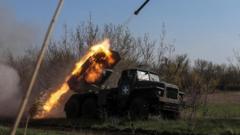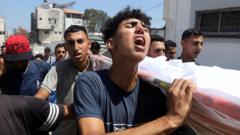A coalition of Ukraine's European allies has announced a substantial military aid package amounting to €21 billion ($24 billion) in a bid to bolster Ukraine's defenses against ongoing hostilities from Russia. This announcement comes during a pivotal moment in the war, as experts warn that the conflict shows no signs of abating.
### New Military Aid Commitment of €21bn for Ukraine by European Allies

### New Military Aid Commitment of €21bn for Ukraine by European Allies
European nations come together, pledging €21 billion in military support as the war in Ukraine continues to rage on.
The recent commitment includes a significant contribution of €11 billion from Germany over the next four years, underscoring Germany's determination to play a key role in supporting Ukraine's military efforts. British Defence Minister John Healey emphasized the urgency of the situation, noting that this aid sends a decisive message to Moscow.
The pledges were made during a gathering of the Ukraine Defence Contact Group at NATO headquarters in Brussels, where defense ministers discussed critical military needs. The aid consists of advanced air defenses, missiles, and various military equipment aimed at filling the void left by shifting U.S. priorities regarding military support.
European defense leaders expressed their resolve to continue providing assistance as the war shows no signs of a resolution, despite former U.S. President Donald Trump’s previous calls for a ceasefire. The recent aid package is also complemented by a £450 million contribution from both the UK and Norway, which will be utilized for assets such as radar systems, anti-tank mines, and numerous drones critical for Ukraine's defense.
A focal point of the meeting was the urgent need for air defense systems, given rising casualties attributed to drone warfare. Healey reported that drone-related injuries now comprise 70% to 80% of battlefield casualties, emphasizing the necessity for effective countermeasures.
Germany further pledged its commitment with a robust artillery support package that includes sending significant quantities of ammunition and armored vehicles. The German defense minister, Boris Pistorius, highlighted that a strong military presence is essential for establishing a sustainable peace.
The importance of international unity was reiterated as defense ministers from 50 countries convened, while U.S. Defense Secretary Pete Hegseth participated virtually, reaffirming America’s continuous support for Ukraine.
Ukrainian Defense Minister Rustem Umerov expressed gratitude towards Europe for stepping in as a leading force advocating for the necessary security assistance. He confirmed the ongoing support from the U.S. despite its shifting dynamics.
Furthermore, both Healey and Pistorius criticized Russia for stalling peace efforts despite the clear will for negotiations from Ukraine's allies. Amidst these discussions, U.S. special envoy Steve Witkoff visited Russia to review peace prospects, meeting with President Vladimir Putin, although no breakthroughs were anticipated.
As the war persists, updates on battlefield movements are critical, with Russia claiming recent territorial gains in Ukraine’s Sumy region, an assertion yet to be confirmed by Ukrainian authorities.
In this complex geopolitical landscape, the support from European allies remains paramount in Ukraine’s struggle to maintain sovereignty and seek a path toward lasting peace.
The pledges were made during a gathering of the Ukraine Defence Contact Group at NATO headquarters in Brussels, where defense ministers discussed critical military needs. The aid consists of advanced air defenses, missiles, and various military equipment aimed at filling the void left by shifting U.S. priorities regarding military support.
European defense leaders expressed their resolve to continue providing assistance as the war shows no signs of a resolution, despite former U.S. President Donald Trump’s previous calls for a ceasefire. The recent aid package is also complemented by a £450 million contribution from both the UK and Norway, which will be utilized for assets such as radar systems, anti-tank mines, and numerous drones critical for Ukraine's defense.
A focal point of the meeting was the urgent need for air defense systems, given rising casualties attributed to drone warfare. Healey reported that drone-related injuries now comprise 70% to 80% of battlefield casualties, emphasizing the necessity for effective countermeasures.
Germany further pledged its commitment with a robust artillery support package that includes sending significant quantities of ammunition and armored vehicles. The German defense minister, Boris Pistorius, highlighted that a strong military presence is essential for establishing a sustainable peace.
The importance of international unity was reiterated as defense ministers from 50 countries convened, while U.S. Defense Secretary Pete Hegseth participated virtually, reaffirming America’s continuous support for Ukraine.
Ukrainian Defense Minister Rustem Umerov expressed gratitude towards Europe for stepping in as a leading force advocating for the necessary security assistance. He confirmed the ongoing support from the U.S. despite its shifting dynamics.
Furthermore, both Healey and Pistorius criticized Russia for stalling peace efforts despite the clear will for negotiations from Ukraine's allies. Amidst these discussions, U.S. special envoy Steve Witkoff visited Russia to review peace prospects, meeting with President Vladimir Putin, although no breakthroughs were anticipated.
As the war persists, updates on battlefield movements are critical, with Russia claiming recent territorial gains in Ukraine’s Sumy region, an assertion yet to be confirmed by Ukrainian authorities.
In this complex geopolitical landscape, the support from European allies remains paramount in Ukraine’s struggle to maintain sovereignty and seek a path toward lasting peace.





















